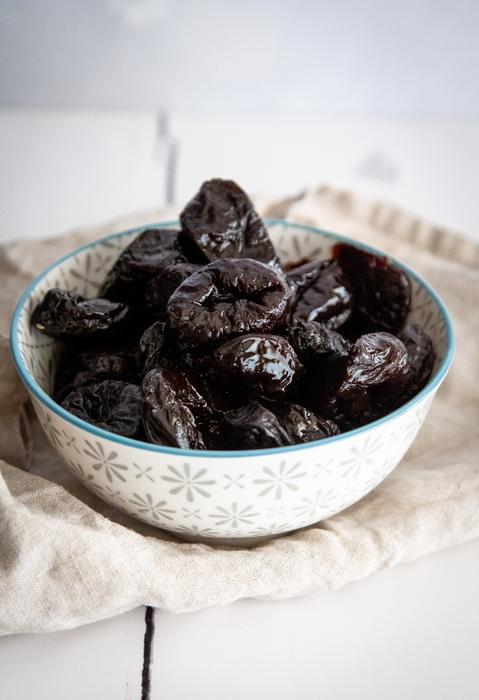A new study published in The Journal of Nutrition shows daily consumption of prunes may reduce inflammation markers connected to bone signaling pathways and reduce the effects of bone loss among postmenopausal women.

Credit: California Prune Board
A new study published in The Journal of Nutrition shows daily consumption of prunes may reduce inflammation markers connected to bone signaling pathways and reduce the effects of bone loss among postmenopausal women.
“Bone loss is a significant issue impacting more than 50% of women over the age of 50, and there is no cure,” said Principal Investigator Mary Jane De Souza, PhD, Professor, Department of Kinesiology, Pennsylvania State University. “While medications and hormone therapies are available, they often require lifelong management and come with risks. It’s important to have a better understanding of how non-pharmacological approaches – like lifestyle and dietary choices—can also impact the progression and mitigation of bone loss.”
The new study’s findings show significant reductions in inflammatory cytokines, which are proteins that help control inflammation, and activated monocytes, which are a major type of immune cell that has been shown to drive the chronic inflammatory response, when 50 to 100 grams of prunes (about 5-12 prunes) are included in the diet, daily. Specifically, reductions were seen in Tumor Necrosis Factor-α following 50 grams of daily prune intake, and reductions in Interleukin-1β, Interleukin-6, Interleukin-8 secretions, as well as activated monocytes, with 100 grams of prune intake, compared to diets without prunes.
“These findings may be attributed to the abundance of bioactive compounds found in prunes, including vitamins, minerals, phenolic acids and polyphenols, which are likely acting synergistically to suppress activated monocytes and their secretion of bone-resorptive inflammatory cytokines,” said Co-author Connie Rogers, PhD, MPH, Professor and Department Head, Department of Nutritional Sciences, University of Georgia.
This is an ancillary study of a larger, single-center, parallel-arm, 12-month randomized control trial[1] (PRUNE study). The PRUNE study aimed to explore immune, inflammatory and oxidative stress markers related to the bone-protective effects of prunes in nonsmoking and not severely obese postmenopausal women, aged 55-75 years who refrained from phenolic supplements or large amounts of phenolic-containing fruit (apples and blueberries) for at least 2 months prior to the start of the study. This investigation was completed by 183 participants who were split into three groups: control/no prunes (n=70), 50 grams/day prunes (n=67) and 100 grams/day prunes (n=46). After a run-in period, participants followed the prune protocol for a total of 12-months and were instructed to record the days and number of prunes eaten in a daily log, used to monitor compliance. Participants were considered compliant if they consumed more than 80% of their prescribed treatment, and all participants consumed more 90% of their prescribed treatment.
Measurements of immune, inflammatory and oxidative stress markers were taken at baseline and at the end of the 12-month intervention. Beyond the prune intake protocols, all participants received a daily dose of calcium and vitamin D3 to meet the recommended dietary allowance of 1200 mg of calcium and 800 IU vitamin D3 daily from diet plus supplements, and they followed a free-living diet.
“These findings add to a growing body of research and interest investigating the role of ‘food as medicine’ and complement other studies I have conducted using the same data,” De Souza said. “For example, the previous study I led showed connections between hip bone integrity and daily consumption of prunes—where postmenopausal women who did not eat prunes lost 1.5% of their hip bone density compared to women who ate 5-6 prunes daily. Collectively, these findings have significant practical importance given the prevalence of bone loss among this population.”
“Our investment in the PRUNE study has led to many key publications and novel findings that can help improve public health and the understanding of the role foods may play in disease prevention and management,” said Donn Zea, executive director, California Prune Board. “We are deeply committed to the scientific rigor of our nutrition research program which provides a license to communicate how enjoying California Prunes can have an effect on health outcomes.”
For about 100 calories, a serving of 4-6 California Prunes is a nutrient-dense superfood providing more than 20 different vitamins, minerals and plant compounds to the diet. As a premium dried fruit enjoyed across cultures and ethnicities, research into California Prunes’ health benefits contributes to a better understanding of their role as a dietary tool to promote health and potentially lower chronic disease risk.
# # #
ABOUT THE CALIFORNIA PRUNE BOARD
The California Prune Board was established in 1952 to represent growers and handlers under the authority of the California Secretary of Food and Agriculture. California is the world’s largest producer of prunes with orchards across 14 counties in the Sacramento and San Joaquin valleys. Promoting a lifetime of wellness through the enjoyment of California Prunes, the organization leads the premium prune category with generations of craftsmanship supported by California’s leading food safety and sustainability standards. California Prunes. Prunes. For life.
[1] De Souza MJ, Strock NCA, Williams NI, Lee H, Koltun KJ, Rogers C, Ferruzzi MG, Nakatsu CH, Weaver C. Prunes preserve hip bone mineral density in a 12-month randomized controlled trial in postmenopausal women: the Prune Study. Am J Clin Nutr. 2022 Oct 6;116(4):897-910. doi: 10.1093/ajcn/nqac189. PMID: 35798020.
Journal
Journal of Nutrition
DOI
10.1016/j.tjnut.2023.11.014
Method of Research
Randomized controlled/clinical trial
Subject of Research
People
Article Title
Prune Consumption Attenuates Proinflammatory Cytokine Secretion and Alters Monocyte Activation in Postmenopausal Women: Secondary Outcome Analysis of a 12-Mo Randomized Controlled Trial: The Prune Study
Article Publication Date
19-Nov-2023
COI Statement
CW and CJR are members of the Nutritional Advisory Panel for the California Prune Board. All other authors report no conflict of interest.




